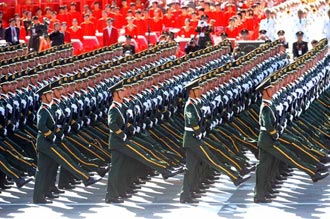The rise of China from two centuries of humiliation and suffering is one of the bright spots of today’s news feeds, but increasingly frequent pronouncements of an emerging “Chinese Century” seem premature.
I don’t question the inevitability of another Asian Millennium. By sheer numbers and momentum few would doubt that most of the next thousand years will be dominated by Asians, whether they’re living in China, India, Korea, Japan, North America, Russia or Australia.
But to call the 21st century the Chinese Century reminds me of early 20th Century pronouncements of a German Century. The German Empire was widely deemed preeminent on the continent. It didn’t take many battles after the start of World War I in 1914 to expose the folly of such pronouncements. By early 1918 the empire that Otto von Bismarck had so masterfully and painstakingly crafted through a virtuoso exercise of social engineering, realpolitik and supreme restraint had been smashed and beggared — and the American Century roared under way.
I’m not saying that a similarly sad fate awaits China. That depends on whether Beijing’s bosses control the hawkish impulses toward a grudge match against Japan or to try to call “the bluff of the US paper tiger”. If China does resist such impulses toward military adventure and keeps patiently building its economic base and evolving its political system for the next half century, it may find itself competing against North America, the European Union, an East Asian confederation and India for preeminence in the 22nd Century.
Prognostications of a Chinese Century are based mostly on the fact that China’s GDP will likely equal the US’s in six or seven years. If GDP were the measure of a nation’s global ascendency, the 17th through the 19th centuries would have been Chinese centuries. During each of those three centuries China, by virtue of its immense population, easily surpassed every other nation in total productive output. Yet most historians would say that all three of those centuries belonged to the United Kingdom which had a small fraction of China’s GDP, only managing to build its GDP to about 65% of China’s by the end of the 19th century thanks to the industrial revolution.
Global preeminence is measured by influence. Britain’s industry, educational system, laws, political system, language and culture were emulated around the world, voluntarily and involuntarily, with admiration and begrudgingly, throughout the 17th through the 19th Centuries. Even as France, Austria, Russia and Germany came to rival or even exceed Britain’s military prowess during the latter part of that era, more people around the world respected things British than those of any other nation. Despite its immense GDP China was a virtual non-entity during that time.
Everything that could be said of Britain during the 17th through the 19th centuries can be said of the United States during the 20th. Love it or hate it, the US was the indispensable military, economic, cultural and social power against which all other nations were measured. It was the most imitated society of the last century — all of it voluntarily.
US influence has diminished only marginally this century despite China’s swift rise as an economic and possibly military rival. While billions still want to talk, dress, work, play and live like Americans, few seek to imitate China’s culture and lifestyle. Few study Chinese films, magazines or music videos to see how China’s people talk, dress or act. Given a choice, few would choose migrate to China over the US. As a matter of fact, China is typically regarded as a highly undesirable place to live, even among China’s most affluent people.
What would it take for the 20th Century to become a truly Chinese Century? At a minimum a standard of living and personal rights and freedoms comparable to those enjoyed by a majority of Americans.
The economic consideration alone would push the start of the Chinese Century back by at least another generation even if China manages to average 6% growth during that span — a tall order – and its rivals stopped growing altogether. Realistically, it would take two generations before China can produce a majority middle class with a standard of living comparable to that of the US.
Even more problematical is the task of evolving China’s social system to achieve a degree of personal security that can make some future generation transcend the insecurity created by today’s repression and corruption. Even if radical reforms managed to eradicate the grosser forms of such evils within two decades, it would likely take at least another generation to evolve a lifestyle worthy of emulation. That again would take us well beyond mid-century.
Premature declarations of a Chinese Century only bring to mind the many other obstacles that stand in the way. China — which is an empire after all — can splinter like the Roman Empire, the Mongol Empire, the German Empire or the Soviet Union. The Communist Party can seek to preserve its one-party rule a bit too long and fall to a democratic revolution. Military ambitions and adventures could send the national budget spiraling out of control and send the nation to the brink of financial collapse before China achieves the degree of social stability needed to weather such crises.
The eventual emergence of a true Chinese Century would be a happy development because it would be the natural product of a large population evolving into a prosperous and secure one over generations of peaceful reforms and economic development. Premature declarations of a Chinese Century are hubris-inducing delusions which, like the German Century, can become a self-destroying prophecy.

